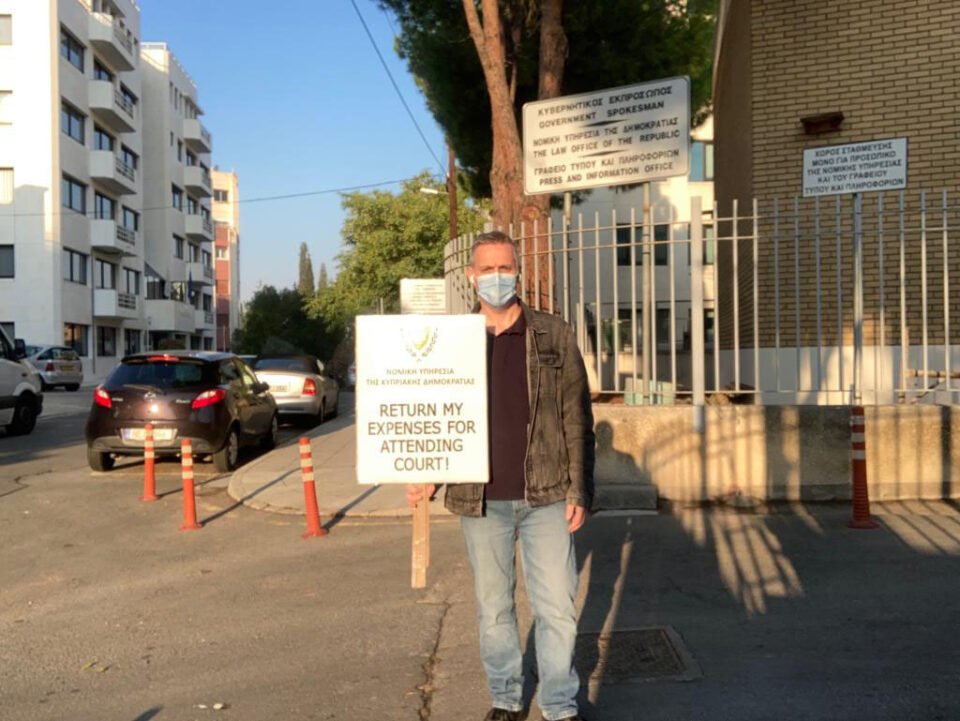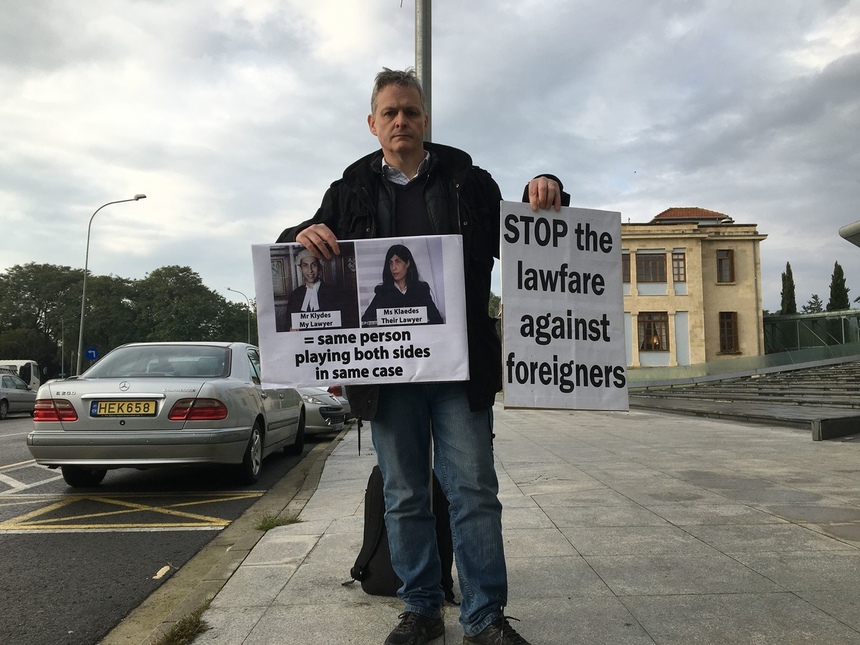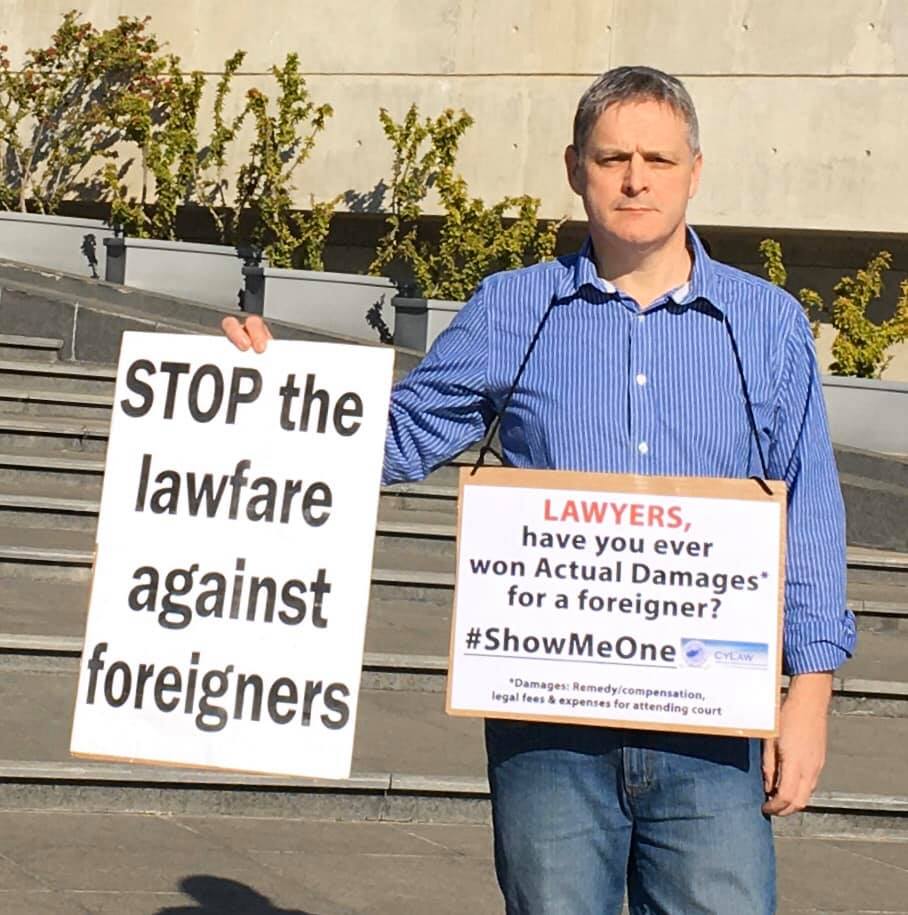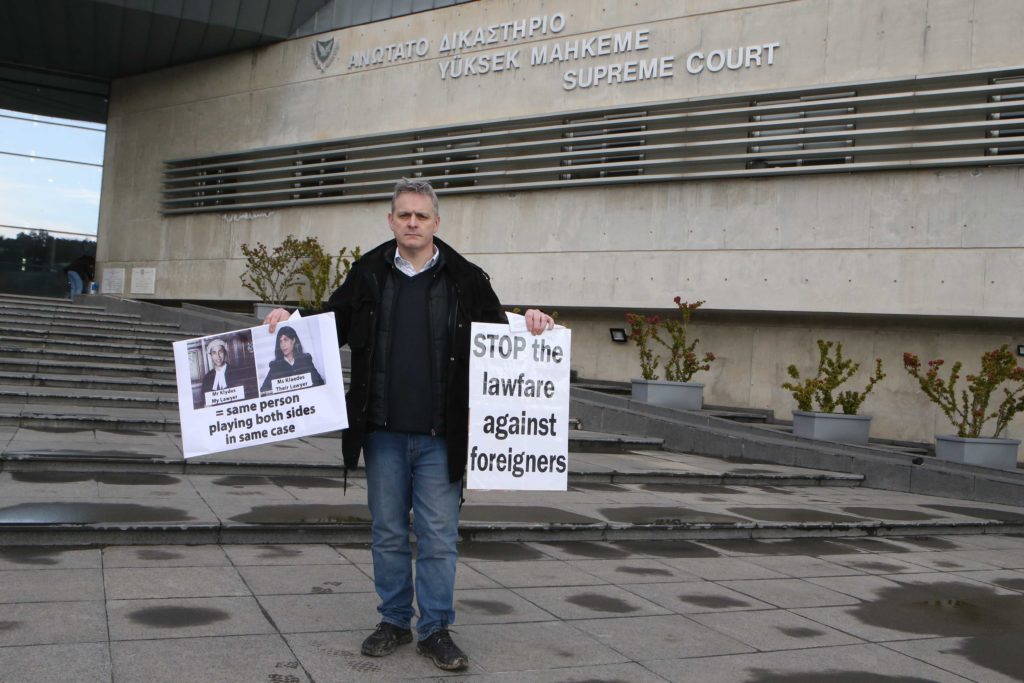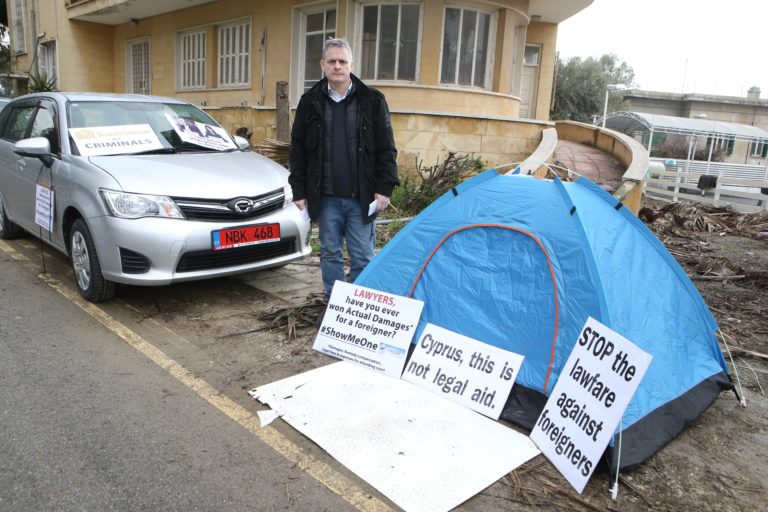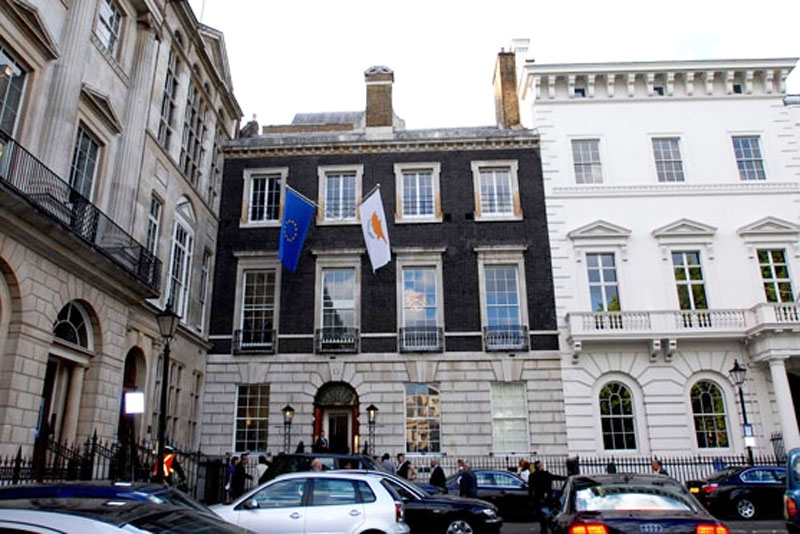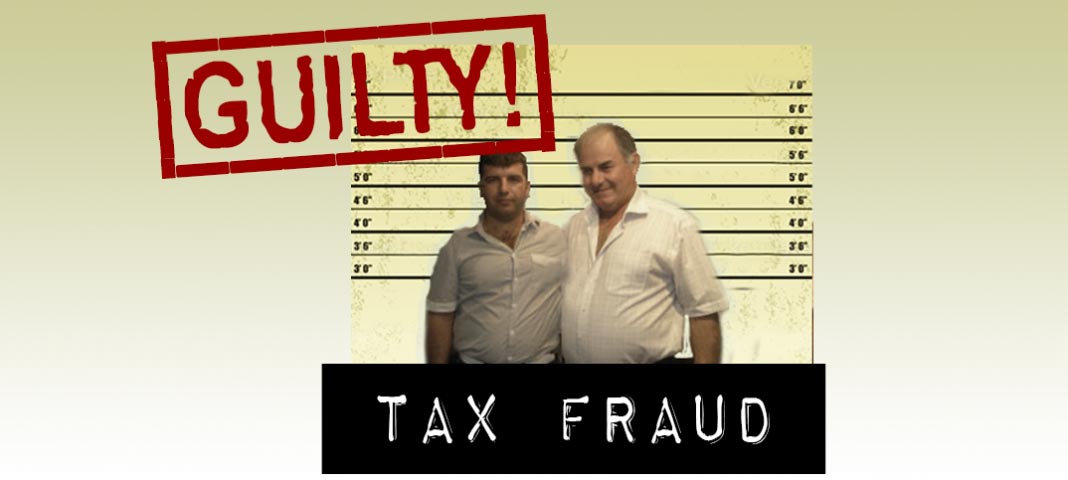ΑΝΩΤΑΤΟ ΔΙΚΑΣΤΗΡΙΟ ΚΥΠΡΟΥ
ΑΝΑΘΕΩΡΗΤΙΚΗ ΔΙΚΑΙΟΔΟΣΙΑ
(Υπóθεση Αρ. 1407/2011)
20 Μαρτίου, 2015
[ΠΑΜΠΑΛΛΗΣ, Δ/στής]
ΑΝΑΦΟΡΙΚΑ ΜΕ ΤΟ ΑΡΘΡΟ 146 ΤΟΥ ΣΥΝΤΑΓΜΑΤΟΣ
CHR. KARAYIANNAS & SONS DEVELOPERS LTD
KARAYIANNAS SHOPPING PLAZA,
Αιτητές,
ν.
ΚΥΠΡΙΑΚΗΣ ΔΗΜΟΚΡΑΤΙΑΣ, ΜΕΣΩ ΤΟΥ
ΥΠΟΥΡΓΕΙΟΥ ΟΙΚΟΝΟΜΙΚΩΝ ΚΑΙ/Ή ΤΜΗΜΑΤΟΣ
ΤΕΛΩΝΕΙΩΝ ΚΑΙ/΄Η ΥΠΗΡΕΣΙΑΣ ΕΦΟΡΟΥ
ΦΟΡΟΥ ΠΡΟΣΤΙΘΕΜΕΝΗΣ ΑΞΙΑΣ,
Καθ’ων η αίτηση.
Α. Κλαίδη (κα), για τους Αιτητές.
Ε. Καρακάννα (κα), Δικηγόρος της Δημοκρατίας Α΄, εκ μέρους του Γενικού Εισαγγελέα, για τους Καθ’ων η αίτηση.
Α Π Ο Φ Α Σ Η
ΠΑΜΠΑΛΛΗΣ, Δ.: Οι αιτητές, ως επιχειρηματίες ανάπτυξης γης, δραστηριοποιούνται σε ιδιόκτητα τεμάχια ή σ’ άλλα που αποτελούν αντικείμενο αγοράς από τρίτα πρόσωπα, με τη μέθοδο της αντιπαροχής.
Σε διενεργηθέντα έλεγχο από Λειτουργούς του Εφόρου Φόρου Προστιθέμενης Αξίας, στα γραφεία των αιτητών, που διεξήχθη από το Σεπτέμβριο του 2010 μέχρι τον Οκτώβριο του 2011 και εξετάστηκαν οι φορολογικές περίοδοι από την 1η Μαΐου 2006 μέχρι 30 Νοεμβρίου 2010, διαπιστώθηκε ότι, οι αιτητές δεν απέδωσαν ΦΠΑ (Φόρο Εκροών) για συναλλαγές που αφορούσαν πωλήσεις κατοικιών και διαμερισμάτων, όπως επίσης και εργολαβικές εργασίες ανέγερσης κατοικιών.
Ταυτοχρόνως διαπιστώθηκε ότι οι αιτητές είχαν διεκδικήσει, λανθασμένα, φόρο εισροών.
Συγκεκριμένα διαπιστώθηκε ότι:
Α. Παράλειψη απόδοσης φόρου εκροών.
- Για την κατοικία Α34, στο συγκρότημα ANDRIANI, ο τρόπος αποπληρωμής του τιμήματος ήταν, η καταβολή χρηματικού ποσού και ανταλλαγή ακίνητης ιδιοκτησίας. Οι αιτητές είχαν καταβάλει φόρο εκροών, μόνο για τη χρηματική αντιπαροχή χωρίς ν’ αποδώσουν φόρο εκροών για την ανταλλαγή της ακίνητης ιδιοκτησίας. Το ύψος του φόρου εκροών ανήρχετο σε €22.286,09.
- Η κατοικία αρ. 2 στο συγκρότημα AMASIS, πωλήθηκε στα πλαίσια διακανονισμού με άλλη εταιρεία. Τέθηκε στη διάθεση του τελικού ιδιοκτήτη τον Ιούλιο του 2010 και δεν καταβλήθηκε από τους αιτητές ο φόρος εκροών για ολόκληρο το ποσό.
- Οι αιτητές παρέλειψαν να αποδώσουν φόρο εκροών, για το υπόλοιπο ποσό 20 κατοικιών τις οποίες παρέδωσαν πριν την τελική εξόφληση. Κρίθηκε δε από τους καθ’ων η αίτηση ως ημερομηνία παράδοσης, η ημερομηνία της πρώτης κατανάλωσης ηλεκτρικού ρεύματος.
- Οι αιτητές παρέλειψαν να αποδώσουν φόρο εκροών για το κόστος ανέγερσης κατοικίας στο συγκρότημα BANA.
- Οι αιτητές, σύμφωνα με τις πρόνοιες συμφωνίας αντιπαροχής θα παραχωρούσαν 20 κατοικίες στους ιδιοκτήτες της γης. Οι έξι από αυτές είχαν ολοκληρωθεί, 11 ήταν ημιτελείς και τρεις δεν είχαν κατασκευαστεί. Οι καθ’ων η αίτηση έκριναν ότι, η αξία της αντιπαροχής ήταν ίση με την αξία του ήδη μεταβιβασθέντος, από τους ιδιοκτήτες γης προς τους αιτητές, μεριδίου, καθορίζοντας ως φορολογικό σημείο την ημερομηνία μεταβίβασης του εν λόγω μεριδίου στους αιτητές, οι οποίοι παρέλειψαν να αποδώσουν τον φόρο εκροών που αντιστοιχούσε στην εν λόγω αντιπαροχή.
- Οι αιτητές παρέλειψαν να αποδώσουν φόρο εκροών για την πώληση του διαμερίσματος D21 στο συγκρότημα KING EVAGORAS στο Παραλίμνι.
- Σύμφωνα με τις πρόνοιες της συμφωνίας για ανέγερση του συγκροτήματος GEORGIA στη Λευκωσία, θα παραχωρούνταν τέσσερα διαμερίσματα στους ιδιοκτήτες της γης. Οι καθ’ων η αίτηση, έκριναν, ότι, ενόψει του γεγονότος της υπό εξέλιξη ανέγερσης του συγκροτήματος, η αξία της αντιπαροχής ήταν ίση με την αξία της γης που μεταβιβάστηκε στους αιτητές και ως φορολογικό σημείο κρίθηκε η ημερομηνία μεταβίβασης στο Κτηματολόγιο. Υπολογίστηκε ο φόρος εκροών, που αντιστοιχούσε στην πιο πάνω αντιπαροχή, τον οποίο οι αιτητές παρέλειψαν να αποδώσουν.
- Οι αιτητές δεν απέδωσαν φόρο εκροών αναφορικά με το συγκρότημα SALAMINA στο Φρέναρος στο οποίο έγινε ανταλλαγή τεμαχίου.
Β. Εσφαλμένη διεκδίκηση φόρου εισροών.
- Οι αιτητές εσφαλμένα διεκδίκησαν φόρο εισροών για τιμολόγια για τα οποία δεν παραχωρείτο δικαίωμα έκπτωσης φόρου.
- Διεκδίκησαν φόρο εισροών, για το συγκρότημα KING EVAGORAS, το συγκρότημα KING MENELAOS και AMASIS για τα οποία υπήρχε εξαιρούμενη ανάπτυξη προς την οποία δεν παραχωρείται δικαίωμα έκπτωσης φόρου.
Έχοντας υπόψη τις πιο πάνω διαπιστώσεις, κρίθηκε από τον Έφορο ΦΠΑ ότι, οι φορολογικές δηλώσεις που υποβλήθηκαν από τους αιτητές για την περίοδο 1η Μαΐου 2006 μέχρι 30 Νοεμβρίου 2010 ήταν ελλιπείς και/ή περιείχαν σφάλματα. Ενόψει τούτου, προχώρησε σε βεβαίωση φόρου με βάση το άρθρο 49 του περί Φόρου Προστιθέμενης Αξίας Νόμου του 2000. Οι αιτητές ενημερώθηκαν για το θέμα αυτό με επιστολή ημερ. 10 Οκτωβρίου 2011, στην οποία περιέχετο και η βεβαίωση φόρου ύψους €558.013,31.
Οι αιτητές πρόβαλαν ότι η εν λόγω βεβαίωση φόρου ήταν αποτέλεσμα εσφαλμένης εφαρμογής του Νόμου και ελλιπούς έρευνας λαμβάνοντας υπόψη ότι οι καθ’ων η αίτηση παραγνώρισαν ουσιώδη στοιχεία που τους είχαν υποβληθεί.
Κατοικία αρ. 34 στο συγκρότημα ANDRIANI
Αναφορικά με την εν λόγω κατοικία, οι αιτητές εισηγήθηκαν ότι οι καθ΄ων η αίτηση εσφαλμένα δεν έλαβαν υπόψη τους ότι, το ποσό της πώλησης συμπεριλάμβανε και ΦΠΑ. Αντιθέτως, οι καθ΄ων η αίτηση ισχυρίζονται ότι κατά τον υπολογισμό του φόρου εκροών είχαν λάβει υπόψη τους ότι στο ποσό της αντιπαροχής συμπεριλαμβανόταν και ΦΠΑ και γι’ αυτό είχαν προβεί στον υπολογισμό με εσωτερική υφαίρεση, πράξη με την οποία υπολογίζεται ο ΦΠΑ που περιλαμβάνεται στην αντιπαροχή για την απόκτηση ενός αγαθού ή περιουσίας που επιβαρύνθηκε με ΦΠΑ.
Το τίμημα πώλησης ήταν €281.919,00. Ο τρόπος αποπληρωμής είχε προσδιοριστεί ως ακολούθως: Καταβολή χρηματικού ποσού €111.059 και το υπόλοιπο του τιμήματος συμφωνήθηκε όπως αποτελέσει το αντικείμενο ανταλλαγής ακίνητης ιδιοκτησίας ύψους €170.860. Ο φόρος εκροών που οφείλετο, σύμφωνα με τους υπολογισμούς των καθ’ων η αίτηση ήταν €22.296,09 (€170.860 Χ 15/115).
Σε συνάρτηση με τον προβληθέντα ισχυρισμό της αιτήτριας ότι οι καθ’ων η αίτηση δεν έλαβαν υπόψη ότι το ποσό της πώλησης περιλάμβανε και ΦΠΑ, κρίνω ότι δεν ευσταθεί. Στην επιστολή ημερ. 10 Οκτωβρίου 2011 γίνεται αναφορά στο ποσό των €281.919 και για το ΦΠΑ. Με αυτό το δεδομένο οι καθ’ων η αίτηση είχαν προβεί στη συγκεκριμένη πράξη υπολογισμού του φόρου εκροών.
Δεδομένης της φύσης του ΦΠΑ ως αυτοβεβαιούμενου φόρου, η βεβαίωση και πληρωμή του, αποτελεί ευθύνη του επιχειρηματία. (Δημοκρατία ν. Tyrimos Tavern Restaurant Ltd (2000) 3 Α.Α.Δ. 679).
Σύμφωνα με το άρθρο 49(1) του περί Φόρου Προστιθέμενης Αξίας Νόμου του 2000 (95(Ι)/2000) (ο “Νόμος”).
̎49.—(1) Όταν οποιοδήποτε πρόσωπο παραλείψει να υποβάλει οποιεσδήποτε φορολογικές δηλώσεις που απαιτούνται δυνάμει του παρόντος Νόμου (ή δυνάμει οποιασδήποτε διάταξης που καταργήθηκε με τον παρόντα Νόμο) ή να τηρήσει οποιαδήποτε έγγραφα και να παράσχει τις διευκολύνσεις τις απαραίτητες για να επαληθευτούν τέτοιες δηλώσεις ή όταν ο Έφορος κρίνει ότι τέτοιες δηλώσεις είναι ελλιπείς ή ανακριβείς, ο Έφορος δύναται να βεβαιώσει κατά την καλύτερη κρίση του το ποσό του Φ.Π.Α. που είναι οφειλόμενο από αυτό το πρόσωπο και να γνωστοποιήσει το ποσό στο πρόσωπο αυτό.”
Διαπιστωθέντων λαθών στις φορολογικές δηλώσεις ο Έφορος έχει υποχρέωση να προβεί καλόπιστα, και με τον καλύτερο δυνατό τρόπο, στη βεβαίωση φόρου.
Το κατά πόσο, ο Έφορος ΦΠΑ, χρησιμοποίησε, κατά τον καλύτερο δυνατό τρόπο την κρίση του, είναι ζήτημα πραγματικό που εξετάζεται στα πλαίσια της συγκεκριμένης φορολογικής διαφοράς. Η επί τούτου σχετική απόφαση δεν ανατρέπεται αν, μέσα στα πλαίσια του Νόμου, ήταν ευλόγως επιτρεπτή.
Το πιο κάτω απόσπασμα από την Kokos Athanasiou Motors Ltd v. Δημοκρατίας (2000) 3 Α.Α.Δ. 21, είναι σχετικό:
“Ο μόνος περιορισμός που τίθεται στον Έφορο είναι να προβεί στην πράξη υπολογισμού του οφειλόμενου φόρου χρησιμοποιώντας “κατά τον καλύτερο δυνατό τρόπο την κρίση του”. Παρέχεται διακριτική ευχέρεια στον Έφορο να επιλέξει τη μέθοδο υπολογισμού του φόρου με βάση βέβαια τα στοιχεία τα οποία έχει ενώπιόν του.
Καθοδήγηση ως προς την ερμηνεία του όρου “κατά τον καλύτερο δυνατό τρόπο την κρίση του” μπορούμε να αντλήσουμε από την αγγλική νομολογία επί του θέματος και ειδικότερα από τις αυθεντίες:Van Boeckel (πιο πάνω) και Argosy v. Inland Revenue Commissioner [1971] 1 W.L.R. 514.
Σύμφωνα με την Van Boeckel “αυτό που προϋποθέτουν οι λέξεις της διάταξης είναι ότι ο Έφορος θα εξετάσει δίκαια όλο το υλικό που τέθηκε ενώπιόν του και να καταλήξει σε απόφαση η οποία είναι εύλογη και όχι αυθαίρετη ως προς το ποσό του οφειλόμενου φόρου. Από τη στιγμή που υπάρχει κάποιο υλικό που ο Έφορος μπορεί εύλογα να ενεργήσει δεν απαιτείται από αυτόν να προβεί σε διεξαγωγή έρευνας η οποία μπορεί να έχει ή να μην έχει σαν αποτέλεσμα την προσαγωγή περαιτέρω υλικού ενώπιόν του.”.
Η παρεχόμενη εξουσία προς τον Έφορο, αναφορικά με τον τρόπο υπολογισμού του φόρου, είναι ευρεία. Στην Υπ. Αρ. 303/2003, Vasilis Christodoulou Snacks Ltd v. Δημοκρατίας, ημερ. 7 Ιουνίου 2004, αναφέρεται:
“Σε τέτοιου είδους υποθέσεις, αναγνωρίζεται στον Έφορο ευχέρεια επιλογής της μεθόδου υπολογισμού με βάση τα στοιχεία που έχει ενώπιον του. Αν με βάση το υλικό που έχει ενώπιόν του ο Έφορος εύλογα μπορεί να ενεργήσει, δεν απαιτείται να προβεί στη διεξαγωγή περαιτέρω έρευνας. Ακολουθείται διαδικασία πιθανολόγησης σε σχέση με το ποσό της υποχρέωσης. Οι πιο πάνω αρχές πηγάζουν τόσο από την αγγλική νομολογία όσο και από δικές μας αποφάσεις. (Θεοδοσίου ν. Δημοκρατίας, υποθ. αρ. 75/94 ημερ. 13.6.96, Argosy v. Inland Revenue Commissioner(1971) 1 W.L.R. 514.”
Κατά το στάδιο των διευκρινίσεων προβλήθηκε από τους αιτητές ότι, λαμβάνοντας υπόψη το γεγονός ότι το ακίνητο παρέμεινε εγγεγραμμένο στο όνομα της ιδιοκτήτριας της γης, δεν θα μπορούσε να επιβληθεί ΦΠΑ. Οι καθ’ων η αίτηση έλαβαν ως φορολογικό σημείο για σκοπούς ΦΠΑ, “την ημερομηνία κατά την οποία η εν λόγω κατοικία περιήλθε στην κατοχή του ιδιοκτήτη της αφού υπήρχε ουσιαστική κατανάλωση ηλεκτρικού ρεύματος με βάση τις πληροφορίες που λήφθηκαν από ΑΗΚ”.
Η διαφορά μεταξύ των αιτητών και των καθ’ων η αίτηση έγκειται ουσιαστικώς, στο χρόνο παράδοσης της κατοικίας, για φορολογικούς σκοπούς.
Τα άρθρα 5(1) και 7(1) του Νόμου, καθορίζουν πότε επιβάλλεται ΦΠΑ σε παράδοση αγαθών ή παροχής υπηρεσιών.
Το άρθρο 5(1) προβλέπει ότι:
“1) Φόρος προστιθέμενης αξίας επιβάλλεται, σύμφωνα με τις
διατάξεις του παρόντος Νόμου—
(α) Επί της παράδοσης αγαθών και της παροχής υπηρεσιών στο εσωτερικό της Δημοκρατίας (συμπεριλαμβανομένου οτιδήποτε θεωρείται ως τέτοια συναλλαγή)·”
και
Το άρθρο 7(1) αναφέρει ότι:
“Φ.Π.Α. επιβάλλεται επί οποιασδήποτε παράδοσης αγαθών ή παροχής υπηρεσιών που πραγματοποιείται στο εσωτερικό της Δημοκρατίας, όταν είναι φορολογητέα συναλλαγή που πραγματοποιείται από υποκείμενο στο φόρο πρόσωπο μέσα στα πλαίσια ή για προώθηση οποιασδήποτε επιχείρησης που ασκεί.”
Το τι αποτελεί “παράδοση” προσδιορίζεται στο άρθρο 3 του Δευτέρου Παραρτήματος το οποίο αναφέρει ότι:
“Αποτελούν παράδοση αγαθών—
(α) Η μεταβίβαση ακίνητης ιδιοκτησίας·
(β) η μεταβίβαση εξ αδιαιρέτου ιδανικής μερίδας επί ακίνητης ιδιοκτησίας·
(γ) η μεταβίβαση της κατοχής ακίνητης ιδιοκτησίας—
(i) δυνάμει σύμβασης ή συμφωνίας πώλησής της, ή
(ii) δυνάμει συμφωνίας που ρητά προβλέπει ότι θα μεταβιβαστεί και η ακίνητη ιδιοκτησία σε κάποιο χρόνο στο μέλλον.”
Αναφορικά με το χρόνο παράδοσης και πότε θεωρείται ότι γίνεται, σχετικό είναι το άρθρο 9 του Νόμου, που προβλέπει:
“9.—(1) Οι διατάξεις του παρόντος άρθρου εφαρμόζονται τηρουμένων των διατάξεων των άρθρων 13Β και 13Γ για να καθορίζεται ο χρόνος που μια παράδοση αγαθών ή παροχή υπηρεσιών θεωρείται ότι λαμβάνει χώρα για τους σκοπούς επιβολής του Φ.Π.Α.
(2) Τηρουμένων των διατάξεων των εδαφίων (4) μέχρι (14) πιο κάτω, μια παράδοση αγαθών θεωρείται ότι λαμβάνει χώρα—
………
(β) αν τα αγαθά δεν πρόκειται να μεταφερθούν, κατά το χρόνο που τίθενται στη διάθεση του προσώπου προς το οποίο παραδίδονται.”
Η συμφωνία μεταξύ αιτητών και ιδιοκτήτριας της γης, πρόβλεπε για ανταλλαγή της γης με την οικία. Η μεταβίβαση θα λάμβανε χώρα σε μεταγενέστερο στάδιο. Το γεγονός ότι το κτήμα παρέμενε επ’ ονόματι της ιδιοκτήτριας, τούτο δεν εξυπακούει ότι η κατοικία δεν παραδόθηκε στους αιτητές.
Σε έρευνα στην οποία προέβηκαν οι καθ’ων η αίτηση διαπιστώθηκε ότι, ουσιαστική κατανάλωση ρεύματος έγινε και ορθώς κρίθηκε ότι η εν λόγω κατοικία περιήλθε στην κατοχή του αγοραστή της, συνεπώς υπήρξε παράδοση με βάση τις πρόνοιες του Νόμου. Τούτου δοθέντος, ορθώς κρίθηκε ότι η ημερομηνία έναρξης της κατανάλωσης ηλεκτρικού ρεύματος, ως η ημερομηνία καθορισμού της επιβολής φόρου εκροών.
Κατοικία αρ. 2 στο συγκρότημα AMASIS
Αναφορικά με την εν λόγω κατοικία και τα οφειλόμενα υπόλοιπα από την πώληση 20 κατοικιών, οι αιτητές επανέλαβαν και πάλι τον ισχυρισμό ότι οι καθ’ων η αίτηση δεν έλαβαν υπόψη ότι στο οφειλόμενο ποσό συμπεριλήφθηκε ΦΠΑ. Ο υπολογισμός του φόρου εκροών, όπως αναφέρθηκε πιο πάνω, έγινε με εσωτερική υφαίρεση, χρησιμοποιώντας το συντελεστή 115%. Από αυτό συνεπάγεται ότι οι καθ’ων η αίτηση χρησιμοποίησαν τη μέθοδο υπολογισμού στηριζόμενοι στη βάση του ότι, το οφειλόμενο ποσό συμπεριλάμβανε ΦΠΑ. Τέτοιος υπολογισμός βρίσκεται εντός του πλαισίου της διακριτικής ευχέρειας του Εφόρου.
Περαιτέρω, για τις 20 κατοικίες, προβλήθηκε ότι οι καθ’ων η αίτηση, εσφαλμένα θεώρησαν ότι υπήρχε παράδοση, στηριζόμενοι σε στοιχεία της ΑΗΚ, λόγω κατανάλωσης ηλεκτρικού ρεύματος. Στην απαντητική τους αγόρευση, οι αιτητές ισχυρίστηκαν ότι, τα πιο πάνω στοιχεία αφορούσαν κατοικίες άλλες από τις επίδικες και επισύναψαν προς τούτο στοιχεία από την ΑΗΚ.
Κατ’ αρχήν πρέπει να σημειώσω ότι, κατά το στάδιο των αγορεύσεων, δεν είναι επιτρεπτό να προσάγεται μαρτυρία. Εν πάση, όμως, περιπτώσει, τα επισυναφθέντα έγγραφα δεν αποδεικνύουν τα όσα πρόβαλαν οι αιτητές, καθότι δεν καταδεικνύεται ότι πρόκειται για άλλες κατοικίες. Στο διοικητικό φάκελο (τεκμήριο 1) υπάρχουν τα παραρτήματα 15-19 στα οποία αναφέρονται οι 20 κατοικίες που λήφθηκαν υπόψη και η έρευνα που διεξήγαγαν οι καθ’ων η αίτηση.
Δοθέντος ότι, υπήρχε παράδοση, όπως έχω αναλύσει πιο πάνω, η επιβολή του φόρου ήταν εντός του πλαισίου του Νόμου.
Κατοικία στο συγκρότημα ΒΑΝΑ
Με βάση τις πρόνοιες της συμφωνίας αντιπαροχής των ιδιοκτητών με τους ιδιοκτήτες γης, παραχωρήθηκαν δύο κατοικίες και οι αιτητές ανέλαβαν να ανεγείρουν μια κατοικία σε τεμάχιο των ιδιοκτητών στο συγκρότημα ΒΑΝΑ. Οι ιδιοκτήτες είχαν παραχωρήσει τη γη, για ανέγερση του συγκροτήματος STONE MEADOWS. Οι καθ’ων η αίτηση προέβηκαν σε υπολογισμό των υπηρεσιών ανέγερσης και του αντίστοιχου φόρου εκροών. Ο Έφορος υπολογίζει το φόρο, όπως αναφέρθηκε πιο πάνω, χρησιμοποιώντας κατά τον καλύτερο δυνατό τρόπο την κρίση του και δεν έχω διαπιστώσει οτιδήποτε το οποίο να δεικνύει ότι ο εν λόγω υπολογισμός δεν ήταν εύλογος. Σημειώνω περαιτέρω ότι, δεν προβλήθηκε οποιοσδήποτε ισχυρισμός αναφορικά με τη συναλλαγή αυτή.
Συγκρότημα ANDRIANI (BLOCK I&II)
Προβλήθηκε από τους αιτητές ότι εσφαλμένα επιβλήθηκε φόρος εκροών για 20 κατοικίες στο πιο πάνω συγκρότημα, έχοντας υπόψη ότι οι κατοικίες αυτές θα παραχωρούντο στους ιδιοκτήτες δυνάμει συμφωνίας αντιπαροχής. Όπως αναφέρθηκε στις διευκρινίσεις ο αριθμός των κατοικιών ήταν 17 και όχι 20. Σύμφωνα με το παράρτημα 19γ, όντως, υπάρχει κάποια διαφορά, ως προς τέσσερις κατοικίες (αρ. 2,3,4,5) οι οποίες είχαν συμφωνηθεί να δοθούν και στους δυο ιδιοκτήτες της γης. Αυτό, όμως, δεν θεωρώ ότι επηρεάζει την αξία της αντιπαροχής, εφόσον αυτή υπολογίστηκε με βάση την αξία του μεριδίου που δόθηκε ως αντιπαροχή.
Οι καθ’ων η αίτηση διαπίστωσαν ότι είχαν ολοκληρωθεί έξι κατοικίες, 22 ήταν ημιτελείς και τρεις δεν είχαν εκτελεστεί. Κρίθηκε, από πλευράς Εφόρου, ότι, η αξία της αντιπαροχής ήταν ίση με την αξία της γης που μεταβιβάστηκε προς τους αιτητές από τους αρχικούς ιδιοκτήτες. Τούτο έγινε με βάση τη δηλωθείσα αξία στο Κτηματολόγιο. Ως φορολογικό σημείο καθορίστηκε η ημερομηνία μεταβίβασης στο Κτηματολόγιο.
Το άρθρο 14(3) του Νόμου προβλέπει ότι:
“Αν η συναλλαγή πραγματοποιείται έναντι αντιπαροχής μη χρηματικής ή μη εξ ολοκλήρου χρηματικής, η αξία της λαμβάνεται ότι είναι τόσο χρηματικό ποσό όσο, με την πρόσθεση του επιβλητέου Φ.Π.Α., είναι αντίστοιχο προς την αντιπαροχή“.
Οι καθ’ων η αίτηση στη βάση της Ερμηνευτικής εγκυκλίου 105 θεώρησαν ότι η αξία της αντιπαροχής ήταν ίση με την αξία του μεριδίου της γης που τους μεταβιβάστηκε. Η πιο πάνω προσέγγιση ήταν εύλογη και δεν παρέχεται πεδίο επέμβασης.
Αναφορικά με το χρόνο παροχής των υπηρεσιών, το άρθρο 9(4) του Νόμου προβλέπει ότι αν η πληρωμή έγινε, πριν την παράδοση των αγαθών, τότε η παροχή θεωρείται ότι λαμβάνει χώρα κατά το χρόνο που λαμβάνεται η πληρωμή. Στην υπό κρίση περίπτωση η πληρωμή ήταν υπό μορφή μεταβίβασης της γης. Συνεπώς ορθά θεωρήθηκε ως φορολογητέο σημείο ο χρόνος μεταβίβασης της ακίνητης ιδιοκτησίας.
Τα όσα αναφέρει η αιτήτρια, περί εξαιρούμενης συναλλαγής, δεν τυγχάνουν εφαρμογής μετά την τροποποίηση του Νόμου το 2004. Ο φόρος που είχε επιβληθεί δεν αφορούσε την παράδοση της γης, η οποία είναι εξαιρούμενη συναλλαγή, αλλά την παροχή υπηρεσιών ανέγερσης των κατοικιών. Ούτε και τα όσα ισχυρίζεται η αιτήτρια αναφορικά με τα έγγραφα αρ 335-339 του παραρτήματος 2 (συμφωνίες πώλησης), έχουν σχέση με την επιβολή του φόρου, καθότι τούτα δεν λήφθηκαν υπόψη από τους καθ’ων η αίτηση
Διαμέρισμα D21, συγκρότημα KING EVAGORAS
Επιβλήθηκε από τους καθ’ων η αίτηση φόρος εκροών για την πώληση του πιο πάνω διαμερίσματος. Η τιμή πωλήσεως ήταν €126.500 και ο φόρος εκροών ήταν €16.500. Από το εν λόγω ποσό αφαιρέθηκε το ποσό των €2.608,70, το οποίο πληρώθηκε μεταγενέστερα από τον ιδιοκτήτη της κατοικίας. Παρόλο που οι αιτητές δεν προβάλλουν οτιδήποτε συγκεκριμένο, για την εν λόγω επιβολή, θεωρώ ότι ο Έφορος, εφαρμόζοντας ορθά, τις πρόνοιες του Νόμου προέβηκε στο σχετικό υπολογισμό με βάση τα στοιχεία που είχε.
Διαμερίσματα στο συγκρότημα GEORGIA
Οι καθ’ων η αίτηση επέβαλαν φόρο εκροών για την ανέγερση τεσσάρων διαμερισμάτων στο πιο πάνω συγκρότημα. Τα εν λόγω διαμερίσματα είχαν παραχωρηθεί δυνάμει συμφωνίας αντιπαροχής. Η αξία της αντιπαροχής κρίθηκε ότι, ήταν ίση με την αξία της γης που μεταβιβάστηκε από τον ιδιοκτήτη της γης προς τους αιτητές. Καθορίστηκε, επίσης, ως η ημερομηνία μεταβίβασης, για σκοπούς φορολογίας. Σε σχέση με την αξία της αντιπαροχής και τον χρόνο υπολογισμού της, επαναλαμβάνω και υιοθετώ όσα ανέφερα πιο πάνω.
Οι αιτητές εισηγήθηκαν ότι δεν λήφθηκαν υπόψη τα έξοδα μελέτης για τα αρχιτεκτονικά σχέδια, καθώς και άλλες δαπάνες για την ανέγερση των εν λόγω διαμερισμάτων. Οι όποιες δαπάνες έγιναν δεν αποτελούν μέρος της αντιπαροχής και δεν υπολογίζονται. Αυτό αποτελεί θέμα έκπτωσης φόρου. Οι αιτητές είχαν δικαίωμα να υποβάλουν αίτημα, προσκομίζοντας τα απαραίτητα στοιχεία, για διεκδίκηση έκπτωσης.
Κατοικία αρ. 13, συγκρότημα SALAMINA
Επιβλήθηκε επίσης φόρος αναφορικά με την ανταλλαγή της πιο πάνω κατοικίας. “Ανταλλαγή” – “exchange” είναι η αμοιβαία μεταβίβαση ιδιοκτησίας.
Στη βάση των στοιχείων που συνέλεξαν οι καθ’ων η αίτηση από το Κτηματολόγιο διαπιστώθηκε ότι έγινε ανταλλαγή γης για το ποσό των €310.000 και αφορούσε την πιο πάνω κατοικία. Οι αιτητές επαναλαμβάνουν και εδώ ότι, οι καθ’ων η αίτηση δεν υπολόγισαν την έκπτωση φόρου εισροών επί των τιμολογίων αναφορικά με τις αρχιτεκτονικές υπηρεσίες. Όπως ανέφερα πιο πάνω η έκπτωση φόρου δεν υπολογίζεται στην κάθε συναλλαγή.
Φόρος εισροών.
Οι καθ’ων η αίτηση, κατά το διενεργηθέντα έλεγχο, διαπίστωσαν ότι οι αιτητές εσφαλμένα διεκδίκησαν δικαίωμα έκπτωσης φόρου σε σχέση με δυο τιμολόγια. Δεν παρουσιάστηκε οποιαδήποτε στοιχείο το οποίο να αποδεικνύει ότι η πιο πάνω διαπίστωση ήταν εσφαλμένη.
Επίσης διαπιστώθηκε ότι είχε διεκδικηθεί φόρος εισροών σε σχέση με την αγορά κλιματιστικών για καταστήματα που ενοικιάζοντο. Τέλος, οι καθ’ων η αίτηση κατά τον έλεγχο τους διαπίστωσαν ότι οι αιτητές είχαν διεκδικήσει φόρο εισροών για την ανέγερση του συγκροτήματος KING EVAGORAS, KING MENELAOS και ΑMASIS, ενώ μέρος των διαμερισμάτων είχαν ενοικιαστεί.
Το άρθρο 21 του Nόμου προνοεί ότι, πρόσωπα υποκείμενα σε ΦΠΑ δικαιούνται να εκπέσουν το ποσό του φόρου εισροών από φορολογητέες συναλλαγές. Το άρθρο 7(2) του Νόμουπροκαθορίζει ως φορολογητέα συναλλαγή, κάθε παράδοση αγαθών ή υπηρεσιών, η οποία δεν είναι εξαιρούμενη συναλλαγή.
Σύμφωνα με το άρθρο 1 του Όγδοου Παραρτήματος η μίσθωση ακίνητης ιδιοκτησίας αποτελεί εξαιρούμενη συναλλαγή.
Συνεπώς, οι καθ’ων η αίτηση ορθώς δεν αποδέχτηκαν τη διεκδίκηση του φόρου εισροών που υποβλήθηκε από τους αιτητές εφόσον αυτή αφορούσε εξαιρούμενη συναλλαγή. (Υπ. Αρ. 218/2008,Jacomino Enterprises Ltd ν. Δημοκρατίας, ημερ. 5 Μαρτίου 2010).
Στην περίπτωση διεκδίκησης έκπτωσης φόρου οι διατάξεις του Νόμου ερμηνεύονται στενά.
Στην Υπ. Αρ. 50/2008, St. George Hotel Enterprises Ltd ν. Δημοκρατίας, ημερ. 29 Μαρτίου 2010 αναφέρθηκαν τα πιο κάτω με τα οποία συμφωνώ:
“Η επίκληση από την αιτήτρια νομολογίας που αναφέρει ότι οι φορολογικοί νόμοι όταν επιβάλλουν φόρο πρέπει να ερμηνεύονται αυστηρά και σε περίπτωση αμφιβολίας αυτή αποφασίζεται υπέρ του πολίτη, είναι ορθή. Όμως εκεί που ο φορολογούμενος ζητά έκπτωση και/ή απαλλαγή φόρου, τότε οι σχετικές νομοθετικές πρόνοιες ερμηνεύονται αυστηρά εναντίον του φορολογούμενου (βλ. μεταξύ άλλων Μάτσης ν. Δημοκρατίας (1995) 3 Α.Α.Δ. 404, 408 με αναφορά και σε προηγούμενη νομολογία). Παρατίθεται εκεί και το ακόλουθο απόσπασμα από το σύγγραμμα Μ.Δ. Στασινόπουλος «Μαθήματα Διοικητικού Διοικητικού Δικαίου» 3η έκδοση, 1966, σελ. 246:
«Στενή ερμηνεία επιβάλλεται αναμφιβόλως εις τας διατάξεις, αίτινες θεσπίζουν φορολογικάς απαλλαγάς ή εξαιρέσεις, διότι η φορολογική εξαίρεσις ή απαλλαγή, αποτελεί παρέκκλισιν από τον κανόνα της καθολικότητος του φόρου και άρα αι θεσπίζουσαι εξαιρέσεις ή απαλλαγάς διατάξεις είναι διατάξεις εξαιρετικαί, αι δε εξαιρετικής φύσεως διατάξεις, συμφώνως προς γενικούς ερμηνευτικούς κανόνας, δέον να ερμηνεύωνται στενώς̎.
Με γνώμονα τα πιο πάνω βρίσκω ότι η έρευνα στην οποία είχαν προβεί οι καθ’ων η αίτηση ήταν, υπό τις περιστάσεις, η δέουσα και αναλυτική η εξήγηση της συγκεκριμένης κατάληξης τους.
Δεν διαπιστώνεται οποιαδήποτε πλάνη, ώστε να δικαιολογείται επέμβαση του Δικαστηρίου, το οποίο, όπως νομολογιακά καθορίστηκε, δεν μπορεί να εξετάσει και να επέμβει στην ουσιαστική κρίση της διοίκησης – (βλ. Γεωργιάδης ν. Εφόρου Φόρου Εισοδήματος (2000) 3 Α.Α.Δ. 106).
Με γνώμονα τα πιο πάνω η προσφυγή αποτυγχάνει και απορρίπτεται. Ποσό €1200 έξοδα επιδικάζονται υπέρ των καθ’ων η αίτηση και εναντίον των αιτητών.
Κ. ΠΑΜΠΑΛΛΗΣ,
Δ.
Source
